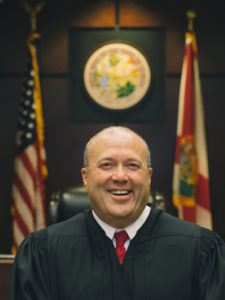
No sunshine in sequestration?
Ask Judge Smith
 By Judge Layne Smith
By Judge Layne Smith
Q. Judge Smith, I was a witness in a criminal case. The morning of the trial, the judge told me to leave the courtroom and return when it was time for me to testify. I spent the next two hours waiting in the hallway before being called to testify. I thought courtrooms were public forums. Why did I have to leave? — Katie
A. Katie, Florida is known as the “Sunshine State” for two reasons. First, it’s a vacation wonderland and people flock to our sunny beaches and amusement parks. Second, the public policy of our state mandates open and transparent government. To quote a song, “Let the Sunshine In!”
Our state’s courtrooms are public forums that are open to the public and the media. However, having an open and transparent government is not the state’s only policy objective. Florida also provides people, businesses and organizations with fair trials, and the law works to balance both objectives.
Pleadings, motions, court orders and other papers filed in civil and criminal cases are public records, and they can be read and copied by anyone. Trials and court hearings are generally open to the public, too. Otherwise, people would have less confidence that our courts are fair and impartial.
The law imposes some exceptions to everyone having complete access to every government record or public forum. Let’s cover two quick examples, including the one that affected you.
Trial judges have the authority to control their courtrooms. When people are disruptive and refuse to behave, judges will have them removed from their courtrooms.
On the other hand, you were instructed to leave the courtroom until it was time for your testimony because of the rule of sequestration.
Fact witnesses are supposed to testify about what they know firsthand. This typically involves something they directly observed or experienced through one or more of their five senses. Generally, witnesses do not testify about what they overheard someone else say (Objection: hearsay. Sustained!).
The rule of sequestration prevents fact witnesses from overhearing other witnesses’ testimony. This ensures they aren’t influenced by what others say, restricting their testimony to what they know.
Usually, the rule of sequestration is invoked before a trial begins. In my courtroom, I explain to the affected witnesses what the rule is and its purpose. When witnesses have finished testifying, I tell them they are free to go, or to remain and observe.
Our law carefully balances the people’s need to observe justice, warts and all, with the parties’ rights to fair and impartial trials. Non-Floridians envy us because our governments are open and transparent, and our courts dispense fair and impartial justice. Visit your county courthouse and see for yourself.
The Honorable J. Layne Smith is a Leon County Judge. Email your questions to askjudgesmith@gmail.com.







